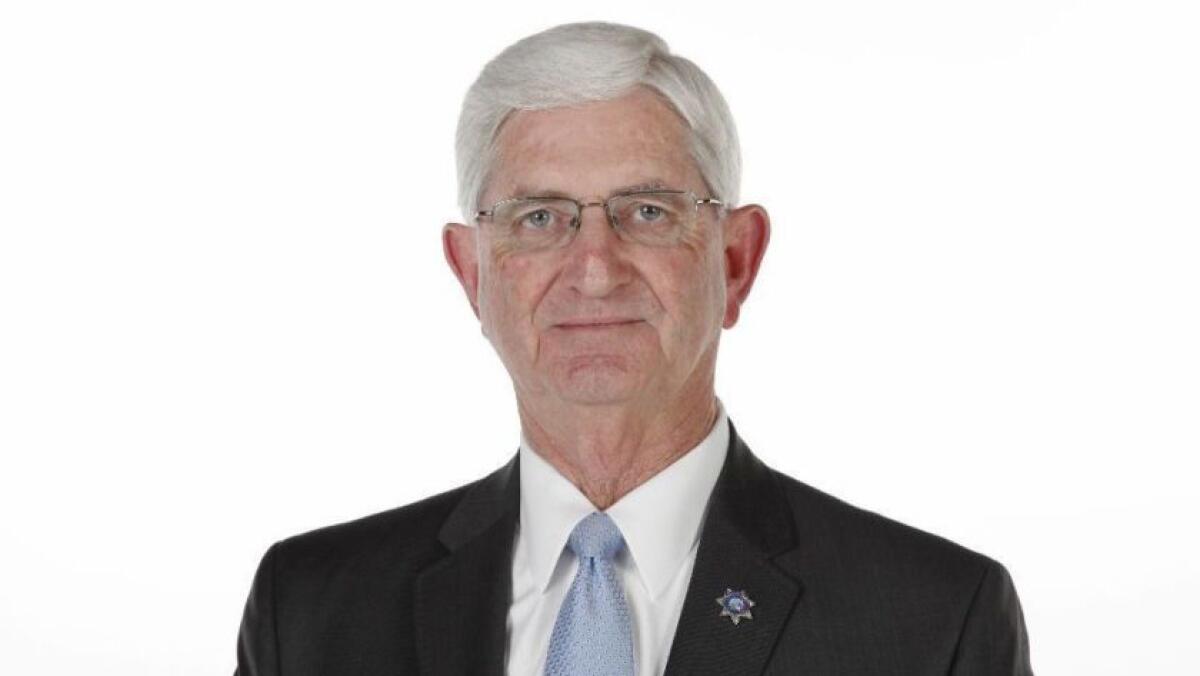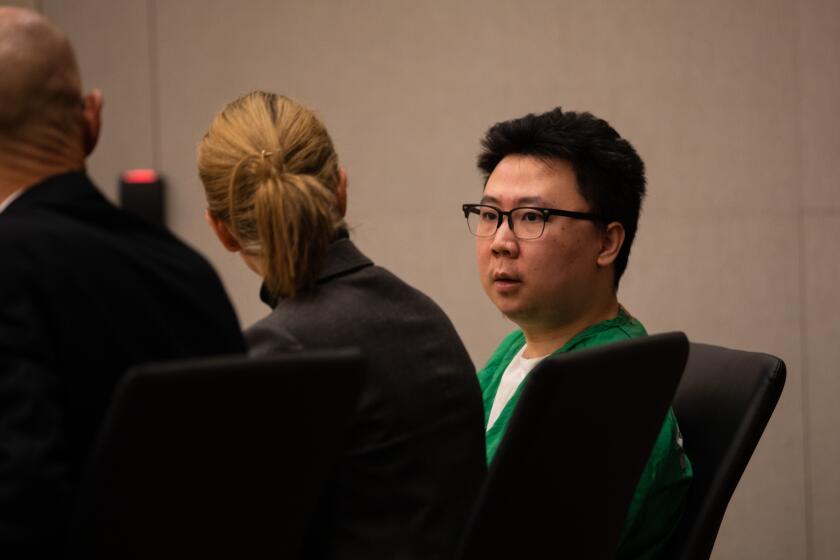Sheriff Bill Gore announces early retirement, starting next month

Gore said last summer that he did not plan on seeking re-election; his retirement is effective Feb. 3
Sheriff Bill Gore announced Wednesday that he is retiring several months earlier than expected, bringing his 51-year career in law enforcement — including more than 12 as the head of the San Diego County Sheriff’s Department — to a close.
Gore, who is currently serving his third term as sheriff, announced last summer that he did not plan on seeking re-election in November. His retirement is effective Feb. 3.
Gore has been an undeniable powerhouse in local law enforcement and politics for more than a decade as the head of the region’s largest law enforcement agency and local jails. He’s also been the target of criticism on several fronts, including the number of deaths in local jails, and what critics view as a lack of action in the wake of several studies that found racial disparities in stops and searches conducted by deputies.
This year’s election to fill his spot will mark the first without an incumbent sheriff on the ballot in more than 30 years.
“Serving as your Sheriff for the last 12 years has been one of the most rewarding experiences of my law enforcement career,” Gore said in a statement.
“I will always be grateful to the residents of this county for their continued confidence and support during my tenure. It has also been my honor to have had the daily support from the extraordinary men and women of this department who sacrifice every day for the citizens of San Diego County.”
Gore spent 32 years in the FBI, including time as director of the San Diego office, before moving into a command role at the Sheriff’s Department.
He said his retirement will afford him the opportunity to devote his time and attention to his wife, who sacrificed much for his success, including her own career as one of the FBI’s first female special agents.
The statement did not say who will lead the department upon Gore’s retirement, however the sheriff said in a department-wide email about his departure that he had “great confidence” in the management team that had been assembled “under the leadership of Undersheriff Kelly Martinez.”
Department officials confirmed Martinez would be acting sheriff until an interim sheriff is appointed.
Martinez was named undersheriff in February, becoming the first woman to hold the post in the department’s history. Two days after Gore announced he wouldn’t seek re-election, Martinez filed paperwork with the county stating she intended to run. High-profile endorsements of Martinez from Gore, county Board of Supervisor Chair Nathan Fletcher, San Diego Mayor Todd Gloria and others soon followed.
Ultimately, the county Board of Supervisors will have the final say on Gore’s interim replacement. After the sheriff’s announcement Wednesday, Fletcher said in a statement that he intended to call a special meeting in March — after the election filing deadline — to consider who will serve the remainder of Gore’s term.
Fletcher said he does not believe the interim sheriff should be a candidate in this year’s election.
“The voters are poised to make a very consequential decision on who they want to be our next Sheriff, and it would be inappropriate for us to put our thumb on the scale this close to the election by appointing a person who is a candidate for Sheriff,” Fletcher said.
Martinez said in a statement Wednesday afternoon that she would not seek appointment to the interim position when it becomes available in a few months.
“The people of San Diego deserve a fair race for Sheriff as well as an appointment process they can trust,” Martinez said. “I’ll work hard to earn the support of San Diego County voters who want a Sheriff with experience and commitment to public safety.”
The situation is reminiscent of Gore’s own ascension to sheriff. When former Sheriff Bill Kolender announced his retirement in 2009 — also before his term ended — he publicly tapped Gore, then the department’s undersheriff, to take over.
A couple of months later, the Board of Supervisors appointed Gore — who was also a candidate in the sheriff’s race — to fill the remainder of Kolender’s term. Supervisors at the time brushed off calls from people who said the board should avoid picking an interim sheriff who is also running for the position because doing so would give that candidate an incumbent-like advantage.
Similarly, in 2017, former San Diego County District Attorney Bonnie Dumanis retired before the end of her term, paving the way for Summer Stephan, then a chief deputy district attorney, to apply for the interim position.
At the time, Stephan had already announced her candidacy for district attorney and had secured key endorsements from members of the county’s political elite, including Gore, former San Diego Mayor Kevin Faulconer and Dumanis herself.
As with the sheriff’s position, the Board of Supervisors was charged with appointing an interim district attorney. Two months after Dumanis announced her resignation, the board unanimously voted to place Stephan in the position, again ignoring calls to choose someone who was not running for the spot.
“The previous board of supervisors had a habit of appointing their chosen candidate for countywide offices very close to an election,” Fletcher, the current Board of Supervisors chair, said. “I didn’t think it was right for them and it would not be right for us.”
Thus far at least three candidates have emerged: Martinez, former sheriff’s Cmdr. Dave Myers and Assistant San Diego City Attorney John Hemmerling.
Myers, a harsh critic of Gore, said he was not surprised by the decision to step away early. He pointed to the prior instances of early retirements followed by appointments of hand-picked successors.
“The voters need to decide,” Myers said. “We don’t need folks in the back of a typical smoke-filled room with a bunch of political insiders deciding who it’s going to be.”
Myers ran against Gore in 2018 and lost, receiving just under 44 percent of the vote to Gore’s 56 percent.
Hemmerling, who oversees the criminal and community justice divisions at the San Diego City Attorney’s Office, said he believes Gore’s reasons for retiring are valid. He also hopes the upcoming election will continue to move forward as an open seat without an incumbent.
“That is all I have been asking,” he said. “The public can vet those who are running.”
Only four men have held the job of sheriff in San Diego County over the last 50 years. The sheriff’s seat has belonged to an incumbent since Kolender was elected in 1994.
It’s a large department, with an annual budget upwards of $1 billion, and a service area covering more than 4,400 square miles. It handles law enforcement in nine cities in the region, from Imperial Beach to Vista, as well as the unincorporated areas. It also runs the county’s seven jails.
The son of a San Diego police officer, Gore grew up in San Diego, and graduated from Crawford High School and University of San Diego. He joined the FBI in 1970, rising to become assistant director, based in Washington, D.C.
He ended his FBI career back in San Diego, where he led the field office until his mandatory retirement at age 55. He soon landed at the Sheriff’s Department and in 2005 was promoted to undersheriff. He went on to spend three terms in the top job.
During his time there, Gore is credited with spearheading the creation of the department’s Cold Case Forensic Team and a Sex Crimes Investigation Unit.
His biography on the department website also notes that he led a move to use “information-led policing,” which uses high-tech crime analysis and investigations to target problem areas and repeat offenders.
His tenure also saw a massive change in corrections throughout the state — a change known as public safety realignment — that allowed certain lower-level offenders to serve years in local jails rather than be sent to prison. That meant more inmates, with longer sentences in local custody. Gore has cited his department’s handling of realignment among his proudest accomplishments.
His time at the top has not been without controversy. Gore continues to face criticism over his department’s handling of inmates, particularly those with mental health struggles. And San Diego County has the highest jail mortality rate among California’s largest counties, with more than 170 deceased inmates in the past dozen years.
Critics have also decried Gore’s lack of action in the wake of several studies that have found sheriff’s deputies stop, search and use force against people of color at higher rates than White people.
Chula Vista Police Chief Roxana Kennedy, who leads the region’s Police Chiefs’ and Sheriff’s Association, said the announcement that Gore was retiring left her sad.
“I knew this day was coming but hoped it would be a day in the future,” she said. “How do you say goodbye to a law enforcement legend?”
The region, she said, benefitted from his leadership, contributions and assistance. On a personal level, she said, she benefitted, too, sometimes calling him for insight and advice. She said Gore brings “experience, knowledge and calm” to the county.
“There are people in life you respect for their rank, but this is a man that people respect because of his character,” Kennedy said.
In the coming weeks, the county will detail how those interested in filling the interim sheriff’s position can apply, how those applications will be vetted and ways the public can weigh in on the decision.
That process will be ironed out at the board’s meeting on Feb. 8, the same day the window to file papers to run for the sheriff’s position closes. Fletcher said appointments will be considered in March.
Updates
8:34 p.m. Jan. 19, 2022: This story was updated with more information.
The latest news, as soon as it breaks.
Get our email alerts straight to your inbox.
You may occasionally receive promotional content from the San Diego Union-Tribune.




